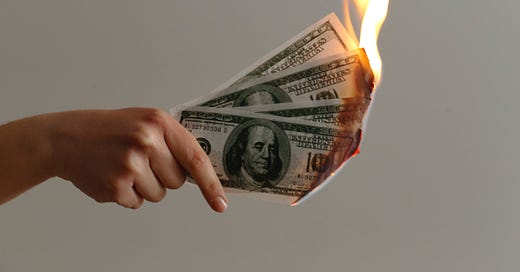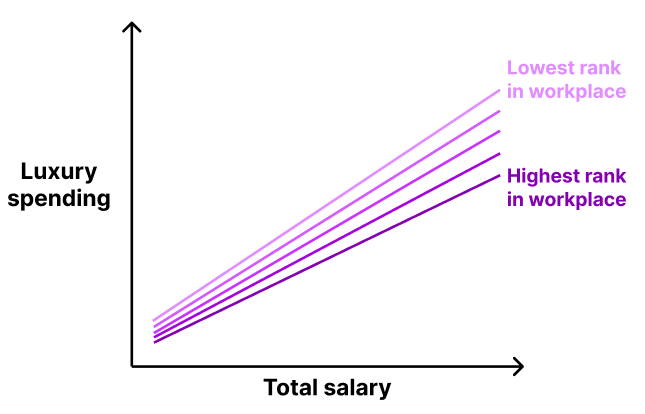💸 How Status Signaling Loses You Money
Data shows inequality in the workplace is linked to extra luxury spending
Social inequality predicts many harmful community outcomes including political polarization, physical health risks, and mental health problems. There’s no doubt that poverty (rather than inequality per se) explains a massive part of those outcomes, but inequality adds the pain of social judgment to the equation. If you’re poor and everyone around you is poor, you suffer together. If you’re poor and everyone around you is rich, you suffer while everyone else thrives. This latter environment heightens the risk of emotional suffering and insecurity.
We normally discuss inequality in the context of wider society, but you can also think about it on a more local level such as among colleagues in the workplace. In fact, inequalities are especially apparent in the workplace because of explicit hierarchies and competitive instinct.
New research is studying this level of social inequality by diving into employee bank records. Scientists are testing how social rank, social inequality, and overall salary at work are linked to luxury spending habits. When you purchase expensive jewelry and high-end designer clothes, it signals status. It seems obvious that richer people will spend more on luxuries overall, but as it turns out, the story doesn’t stop there.

🥇 The link between social rank and status signaling
In a study published in April 2022, a group of UK researchers analyzed the bank transactions of 683,677 employees from 32,008 businesses. They restricted their analysis to smaller businesses employing 100 or fewer people in order to exclude large organizations where groups of coworkers might never interact with each other.
The researchers identified employees from payroll data contained in bank transactions. When an individual bank customer had a regular salary paid by a small business, they qualified as a participant.
In addition to recording salaries, the researchers analyzed all employee credit and debit card transactions with a particular focus on transactions categorized as “luxury merchants”. This included airlines, jewelry stores, and expensive car manufacturers.
By collecting salary data for many employees per business, the researchers could infer salary equality at each business as well as each employee’s salary rank (i.e. where their salary fit within their company hierarchy). This allowed them to model how socioeconomic variables predicted luxury spending and status signaling.
Unsurprisingly, luxury spending increased with higher salaries. People with the lowest salaries spent around 10% of their transactions in the luxury sector compared to around 13% for people with the highest salaries.
More interestingly, luxury spending also increased with greater company inequality. When people worked in a less balanced salary environment, they spent more of their hard-earned cash on luxury status signals. This effect was most powerful at lower salaries, suggesting that poorer employees felt a particularly high pressure to keep up with colleagues.
A similar pattern emerged for salary rank. People at the lowest rank within their companies spent more of their cash on luxury signaling, while people at the highest rank spent less. This might sound a little confusing given that richer people spent more on luxuries overall, so I’ve made the chart below to demonstrate what’s going on (it’s a simplified version of a graph within the paper):
You can see that as total salary increases, so does luxury spending overall. But when you look at different ranks as depicted by the different purple shades, the low-rank people have the highest overall trajectory. In other words, people who make less money than their colleagues splash out more for luxuries.
As you might have spotted in the chart above, people at the highest end of the absolute salary range are most affected by rank differences. If you make a huge load of cash, you invest heavily in luxuries to compete with people at a higher rank than you in your company (keep in mind that even if you’re rich, people you work with might be much richer!). In contrast, if you earn the highest salary at your company, you might feel you have less to prove.
This is the opposite pattern to the previous salary equality analysis, which showed a stronger inequality effect at lower salaries. It seems that people with low incomes are more influenced by social inequality while people with high incomes are more influenced by social rank.
So the motivation for status signaling differs depending on context, but people feel a general pressure to keep up with their peers regardless of how good their personal financial circumstances are. In a highly unequal socioeconomic environment and on lower rungs of local social hierarchies, people spend more of their money on signaling wealth.
⭐️ Takeaway tips
Avoid the temptation to keep up: Social competition can lead to bad decisions. For example, as the researchers above say in their paper: “individuals living in more unequal regions borrow more and save less, in part to finance their desire to keep up with the Joneses”. I’ve previously written that judging your current self against your past self is a better indicator of progress than judging yourself against other people. Despite our general tendency to gravitate toward social judgment and social comparison, it’s not a particularly healthy exercise for wellbeing. Build connection with colleagues and learn from their expertise rather than seeing them as competition.
Money has nothing to do with self-worth: Social status is a deeply ingrained construct in human (and other animal) psychology so it’s not easy to avoid thinking in those terms. But we can work on relaxing the grip it has on our emotional health, especially in the context of money. For the average person, questions like “how can I help to make someone’s day better today?” and “what do I like about myself?” are more useful questions for self-worth than “how much money am I making?”.
Beware the risks of social inequality: Both social inequality and perceived social rank affect workplace behavior. When people recognize inequality around them or see themselves as lower in rank, they use their personal resources less productively. If you run a business, think about how this might impact employee health and consider ways of mitigating the risks. And if you’re otherwise employed at a business, don’t let unhelpful social forces sway how you use your well-deserved earnings.
💡 A final quote
“Men's indignation, it seems, is more excited by legal wrong than by violent wrong; the first looks like being cheated by an equal, the second like being compelled by a superior.”
~ Thucydides
❤️ If you enjoyed this, please share it with a few friends. If you’re new here, sign up below or visit erman.substack.com
📬 I love to hear from readers. Leave a comment on this post or feel free to email me your questions.
👋 Until next time,
Erman Misirlisoy, PhD





Being in awe at existence is a state of selfperpetuating bliss indeed, while the "6 basic emotions" currently defined just shows how much contemporary thinking is still stuck in a generalised post war ptsd narrowing of perception, diversifying more unpleasant sensations than pleasurable constructive ones, not even listing arousal, curiosity, extacy, is quite a diminishment of the human emotional scale, & unfavourable from an emomental evolutionary perspective, so yes, be in awe of existence & Life becomes melodic rather than melodramatic